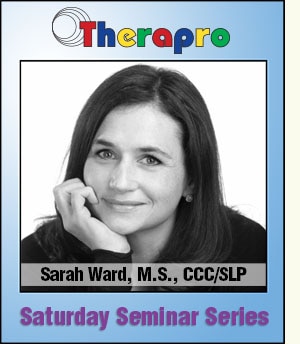 Sarah Ward, CCC-SLP of Cognitive Connections in Concord, MA returned to Therapro for Part II of her talk on Fostering Executive Function Skills. This vibrant speaker shared humorous anecdotes and practical strategies to rev our engines. The 2 hours passed so quickly that she left us wanting more!
Sarah Ward, CCC-SLP of Cognitive Connections in Concord, MA returned to Therapro for Part II of her talk on Fostering Executive Function Skills. This vibrant speaker shared humorous anecdotes and practical strategies to rev our engines. The 2 hours passed so quickly that she left us wanting more!
Video clips and examples of students struggling with executive function skills were utilized throughout Sarah’s presentation. In addition to our students and clients, we recognized our own children and ourselves in some of her examples. She talked about executive functioning for many children as being about “SQ,” meaning “Situational Quotient” rather than about “IQ” – Intellectual Quotient.
Sarah explained the role of working memory and non verbal working future memory, otherwise known as Mimetic Ideational Information Processing, on successful task completion. She labeled this concept as a “mental dress rehearsal” in executive function skills that occurs on a developmental continuum. She described children who have difficulty in this area as being a “beat behind” and taught us how we can help them be a “beat ahead.”
In order to move forward with successful task completion, a student needs to have an accurate concept of time. Sarah broke the task plan into three phases: “Get ready/yellow; Do/green, Done/red.” Phase 1 involves task planning, Phase 2 involves task execution, and Phase 3 involves completion. She offered many, many scenarios where she applied the Ready, Do, Done/Get Done Model. For example: task = doing laundry. GET READY – photos of washer/dryer, laundry detergent. DO – Photos of dials of settings on washer/dryer. DONE/GET DONE – photos of folded laundry in a basket and neat, clean laundry area. Adding a clock to help estimate time is crucial to success because it makes time visible and tangible. Check out the Cognitive Connections website and their Pinterest Board for specific clock strategies, i.e. “working clock”. Therapro can help with time materials with Time Timers products.
The goal for students with poor executive function skills is successful management of school assignments, home activities, and community activities with organization and an accurate sense of time. With the research-based tools Sarah has given us, we are ready to tackle executive function skill development in the educational setting and at home.
Once again, Sarah’s audience loved her practical, dynamic, quick-paced presentation. Take a look at what Sarah’s audience thought of her seminar:
“Great manageable classroom suggestions to set students of all ages up for success!” Meaghan C., Teacher
“Awesome – Great tips – leaving with a much better understanding of how to help my ADHD child with poor EF skills.” Karen L., Parent
“Every student on my caseload presents with executive functioning limitations & now I feel like I have somewhere to start helping them!” Anonymous, Occupational Therapist
“I’m a sophomore in high School and I wish you’d speak to my teachers. This seminar will definitely be helpful in school.” Brian M., Student
“This seminar explicitly and clearly teaches tools for the whole class and interventions for individual students that feels practical enough to implement immediately & with fidelity.” Heather A., Teacher
Thank you, Sarah!
Filomena Connor, MS, OTR/L
